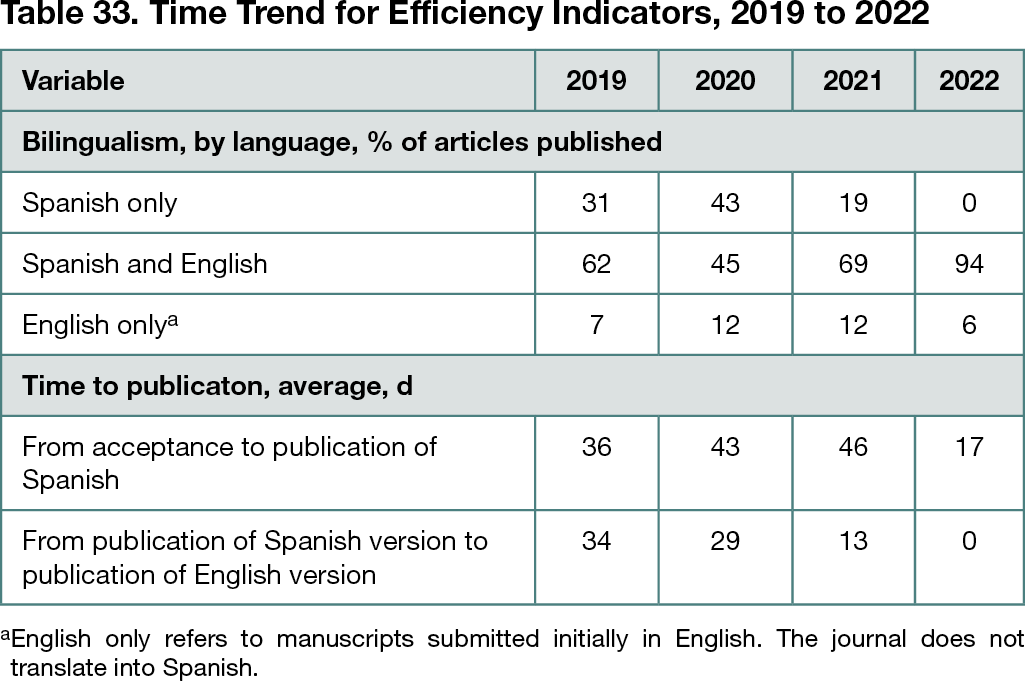A Technology-Based, Quality Improvement Intervention to Ensure Accuracy and Integrity of the Scholarly Record of Articles Published Simultaneously in 2 Languages
Abstract
Vivienne C. Bachelet,1,2,3 Amaya Goyenechea,4 Máximo Rousseau-Portalis5
Objective
Academics in non–English speaking countries seek to publish in journals that promote locally generated knowledge in their language while appreciating having a broader reach to English-language audiences. Accordingly, a medical journal based in Latin America decided to become fully bilingual (Spanish and English). To achieve this objective within the constraints of a limited budget, it was necessary to modernize the editorial and publishing processes and platforms to ensure consistency and accuracy of both languages without overstretching existing resources. A strong editorial board commitment to bilingualism was required to avoid the simpler and less costly decision of publishing only in English.
Design
A quality improvement intervention was designed to overhaul the journal’s peer review, copyediting, and publishing technologies to enable simultaneous publication of the original Spanish version with the journal-provided translation into English at no extra cost to authors, under a single digital object identifier. The intervention consisted of (1) designing a new peer-review software that applies an XML-first approach to the peer-review stage that allows full metadata capture at the start, and integrating multilingual options for both peer-review and copyediting, thus allowing handling of multilingual submissions seamlessly; (2) developing an open-source web-content publication platform to incorporate automated ingestion of XML, JATS, and PDF files and figures; and (3) modernizing the graphic interface and the article-level functionalities in the framework of a bilingual website. The intervention was partially funded by a 2-year grant from the Chilean Ministry of Science. The journal’s editor in chief and editorial staff were involved in all these stages as design partners.
Results
Nine months after implementing the first component of the intervention, the outcomes were full bilingualism, shorter times from acceptance to publication of the article, and simultaneous publication of the Spanish and English versions (Table 33). The second and third components were in the final stages, and full deployment was expected by July 2022. Once 100% rollout of the bilingual copyediting software was achieved, built-in recycling of nontranslatable manuscript sections such as metadata, keywords, abstracts, and references, would reduce inconsistencies between versions and unburden the human translators. Because deployment was still partial, the journal did offline technical editing of both languages simultaneously, thus ensuring the accuracy of both versions. The journal was financially sustainable despite the significant effort and rollout.

Conclusions
Many resources were deployed in this intervention. All articles were published in both languages with a significantly shorter time to publication of the 2 languages. It is expected that, with time, artificial intelligence–based enhancements will result in greater automation and house styling of the Spanish and English versions of accepted manuscripts.
1Escuela de Medicina, Universidad de Santiago de Chile, Santiago, Chile, vbachelet@medwave.cl; 2Medwave; 3Medwave Estudios Limitada, Santiago, Chile; 4Medwave Estudios Limitada, Tel Aviv, Israel; 5Laboratorio de Estadística Aplicada a las Ciencias de la Salud (LEACS), Departamento de Farmacología y Toxicología, Facultad de Medicina, Universidad de Buenos Aires, Buenos Aires, Argentina
Conflict of Interest Disclosures
Vivienne C. Bachelet declared that she is the founding and managing partner of Medwave Estudios Limitada, the publishing company that owns the journal, and is a member of the Peer Review Congress Advisory Board but was not involved in the review or decision of this abstract. No other conflicts were reported.
Funding/Support
This project was cofunded by ANID (National Agency for Innovation and Development) of the Chilean Ministry of Science, Technology, Knowledge, and Innovation through the Scientific Journals Publication Fund, Call for Proposals 2020 (project code FP200001).
Role of Funder/Sponsor
The funders had no role in the execution of this project other than oversight of the proper use of public funds. As the publishing company, Medwave Estudios is also financially responsible for the components of the project not covered by the public subsidy.
